University Code of Ethics: Personal, Corporate, and Ethical Violations
VerifiedAdded on 2023/04/08
|6
|933
|314
Essay
AI Summary
This assignment explores the concept of a code of ethics, encompassing both personal and corporate dimensions. It begins with a student's personal code of ethics, outlining principles such as transparency, adherence to norms, continuous improvement, honoring commitments, fulfilling obligations, and maintaining optimism. The assignment then delves into the importance of each principle, explaining how they contribute to ethical decision-making. Furthermore, it examines the impact of these principles on the decision-making process, emphasizing the benefits of transparency, ethical norms, continuous improvement, commitment, moral obligations, and optimism. The assignment also addresses the synchronization of personal and corporate codes of ethics, suggesting how personal principles can be integrated into an organizational context. Finally, it concludes by discussing the consequences of violating a code of ethics, highlighting potential disruptions to trust, communication, reputation, and job satisfaction. References to relevant academic sources are included to support the analysis.
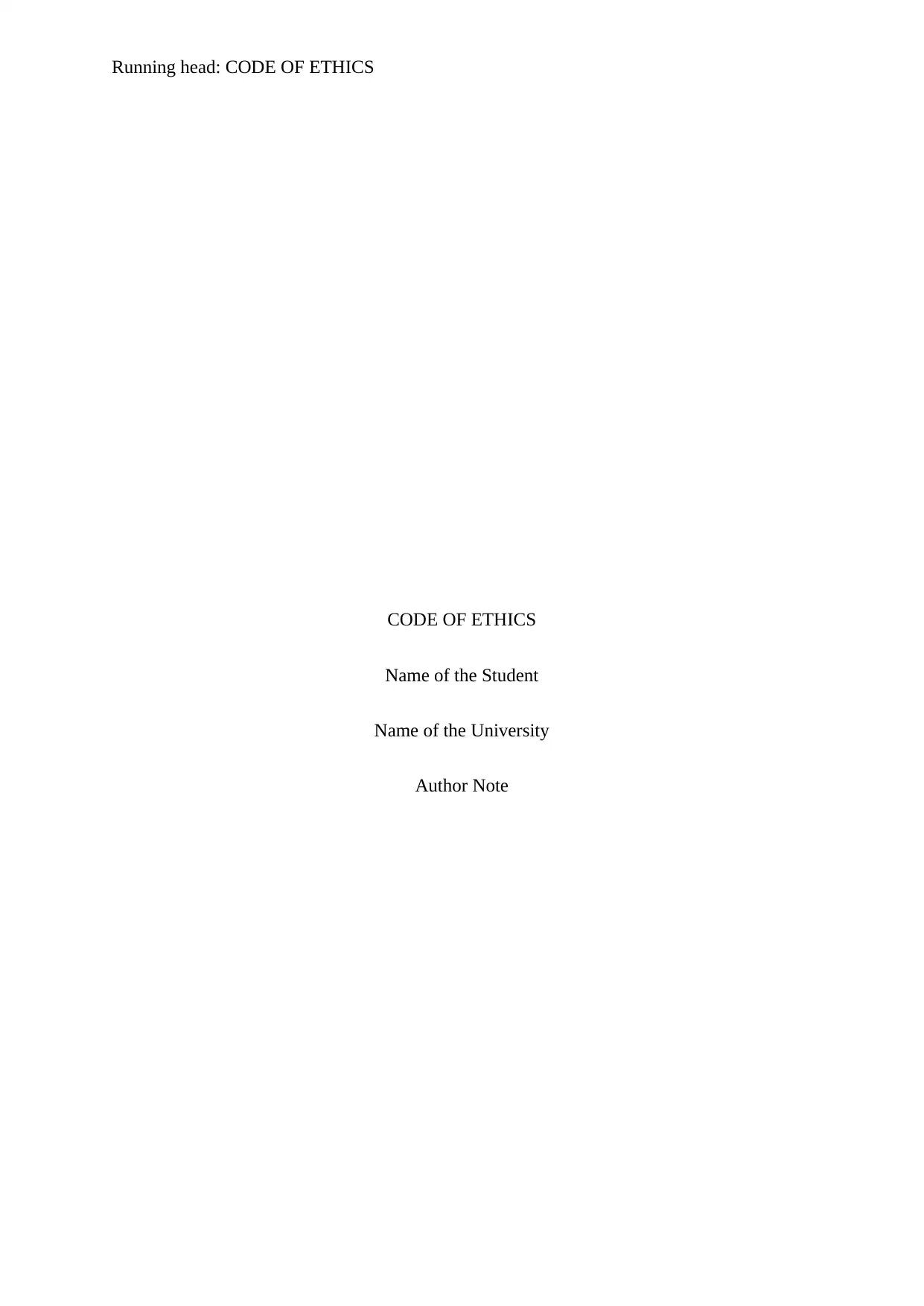
Running head: CODE OF ETHICS
CODE OF ETHICS
Name of the Student
Name of the University
Author Note
CODE OF ETHICS
Name of the Student
Name of the University
Author Note
Paraphrase This Document
Need a fresh take? Get an instant paraphrase of this document with our AI Paraphraser
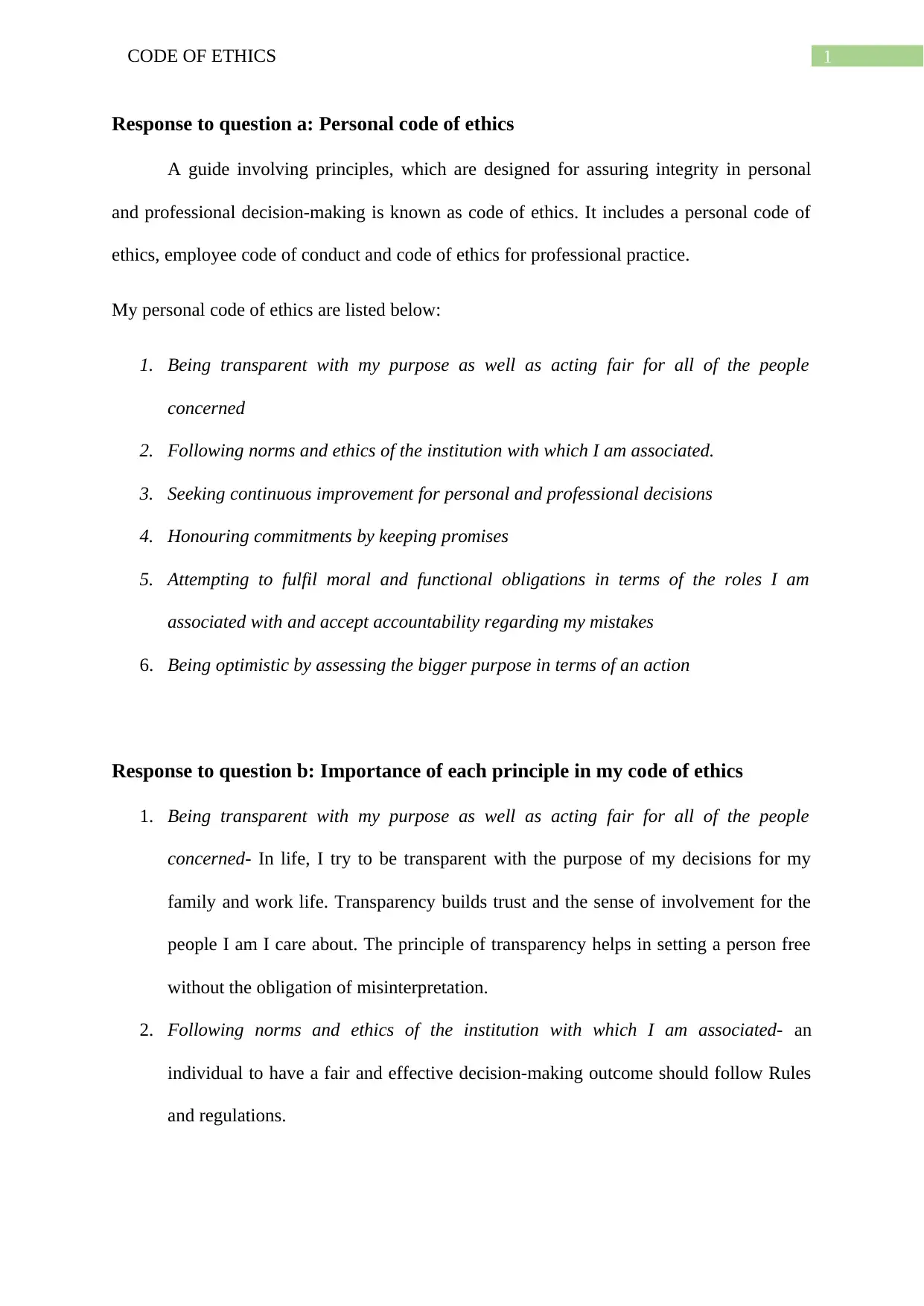
1CODE OF ETHICS
Response to question a: Personal code of ethics
A guide involving principles, which are designed for assuring integrity in personal
and professional decision-making is known as code of ethics. It includes a personal code of
ethics, employee code of conduct and code of ethics for professional practice.
My personal code of ethics are listed below:
1. Being transparent with my purpose as well as acting fair for all of the people
concerned
2. Following norms and ethics of the institution with which I am associated.
3. Seeking continuous improvement for personal and professional decisions
4. Honouring commitments by keeping promises
5. Attempting to fulfil moral and functional obligations in terms of the roles I am
associated with and accept accountability regarding my mistakes
6. Being optimistic by assessing the bigger purpose in terms of an action
Response to question b: Importance of each principle in my code of ethics
1. Being transparent with my purpose as well as acting fair for all of the people
concerned- In life, I try to be transparent with the purpose of my decisions for my
family and work life. Transparency builds trust and the sense of involvement for the
people I am I care about. The principle of transparency helps in setting a person free
without the obligation of misinterpretation.
2. Following norms and ethics of the institution with which I am associated- an
individual to have a fair and effective decision-making outcome should follow Rules
and regulations.
Response to question a: Personal code of ethics
A guide involving principles, which are designed for assuring integrity in personal
and professional decision-making is known as code of ethics. It includes a personal code of
ethics, employee code of conduct and code of ethics for professional practice.
My personal code of ethics are listed below:
1. Being transparent with my purpose as well as acting fair for all of the people
concerned
2. Following norms and ethics of the institution with which I am associated.
3. Seeking continuous improvement for personal and professional decisions
4. Honouring commitments by keeping promises
5. Attempting to fulfil moral and functional obligations in terms of the roles I am
associated with and accept accountability regarding my mistakes
6. Being optimistic by assessing the bigger purpose in terms of an action
Response to question b: Importance of each principle in my code of ethics
1. Being transparent with my purpose as well as acting fair for all of the people
concerned- In life, I try to be transparent with the purpose of my decisions for my
family and work life. Transparency builds trust and the sense of involvement for the
people I am I care about. The principle of transparency helps in setting a person free
without the obligation of misinterpretation.
2. Following norms and ethics of the institution with which I am associated- an
individual to have a fair and effective decision-making outcome should follow Rules
and regulations.
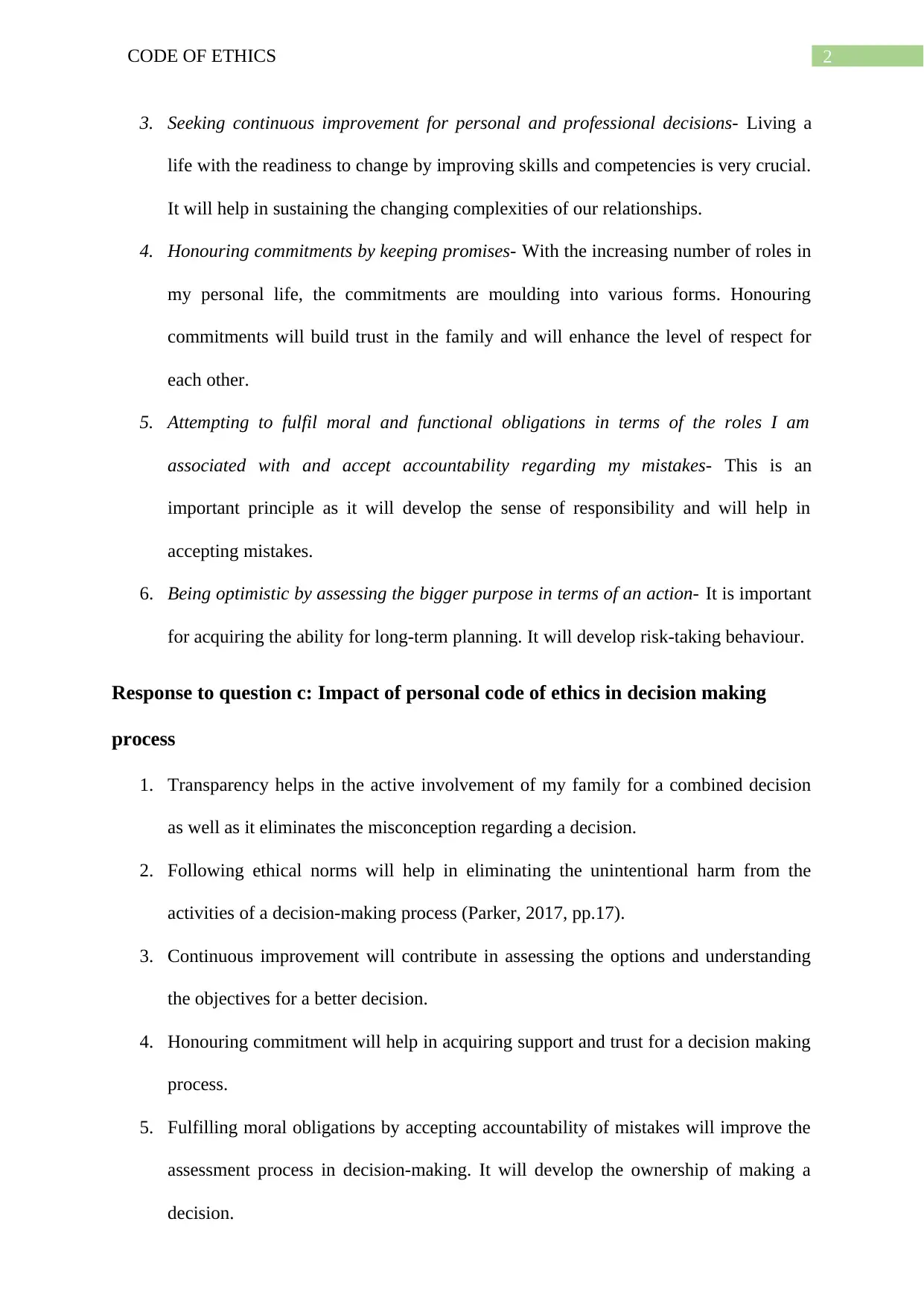
2CODE OF ETHICS
3. Seeking continuous improvement for personal and professional decisions- Living a
life with the readiness to change by improving skills and competencies is very crucial.
It will help in sustaining the changing complexities of our relationships.
4. Honouring commitments by keeping promises- With the increasing number of roles in
my personal life, the commitments are moulding into various forms. Honouring
commitments will build trust in the family and will enhance the level of respect for
each other.
5. Attempting to fulfil moral and functional obligations in terms of the roles I am
associated with and accept accountability regarding my mistakes- This is an
important principle as it will develop the sense of responsibility and will help in
accepting mistakes.
6. Being optimistic by assessing the bigger purpose in terms of an action- It is important
for acquiring the ability for long-term planning. It will develop risk-taking behaviour.
Response to question c: Impact of personal code of ethics in decision making
process
1. Transparency helps in the active involvement of my family for a combined decision
as well as it eliminates the misconception regarding a decision.
2. Following ethical norms will help in eliminating the unintentional harm from the
activities of a decision-making process (Parker, 2017, pp.17).
3. Continuous improvement will contribute in assessing the options and understanding
the objectives for a better decision.
4. Honouring commitment will help in acquiring support and trust for a decision making
process.
5. Fulfilling moral obligations by accepting accountability of mistakes will improve the
assessment process in decision-making. It will develop the ownership of making a
decision.
3. Seeking continuous improvement for personal and professional decisions- Living a
life with the readiness to change by improving skills and competencies is very crucial.
It will help in sustaining the changing complexities of our relationships.
4. Honouring commitments by keeping promises- With the increasing number of roles in
my personal life, the commitments are moulding into various forms. Honouring
commitments will build trust in the family and will enhance the level of respect for
each other.
5. Attempting to fulfil moral and functional obligations in terms of the roles I am
associated with and accept accountability regarding my mistakes- This is an
important principle as it will develop the sense of responsibility and will help in
accepting mistakes.
6. Being optimistic by assessing the bigger purpose in terms of an action- It is important
for acquiring the ability for long-term planning. It will develop risk-taking behaviour.
Response to question c: Impact of personal code of ethics in decision making
process
1. Transparency helps in the active involvement of my family for a combined decision
as well as it eliminates the misconception regarding a decision.
2. Following ethical norms will help in eliminating the unintentional harm from the
activities of a decision-making process (Parker, 2017, pp.17).
3. Continuous improvement will contribute in assessing the options and understanding
the objectives for a better decision.
4. Honouring commitment will help in acquiring support and trust for a decision making
process.
5. Fulfilling moral obligations by accepting accountability of mistakes will improve the
assessment process in decision-making. It will develop the ownership of making a
decision.
⊘ This is a preview!⊘
Do you want full access?
Subscribe today to unlock all pages.

Trusted by 1+ million students worldwide
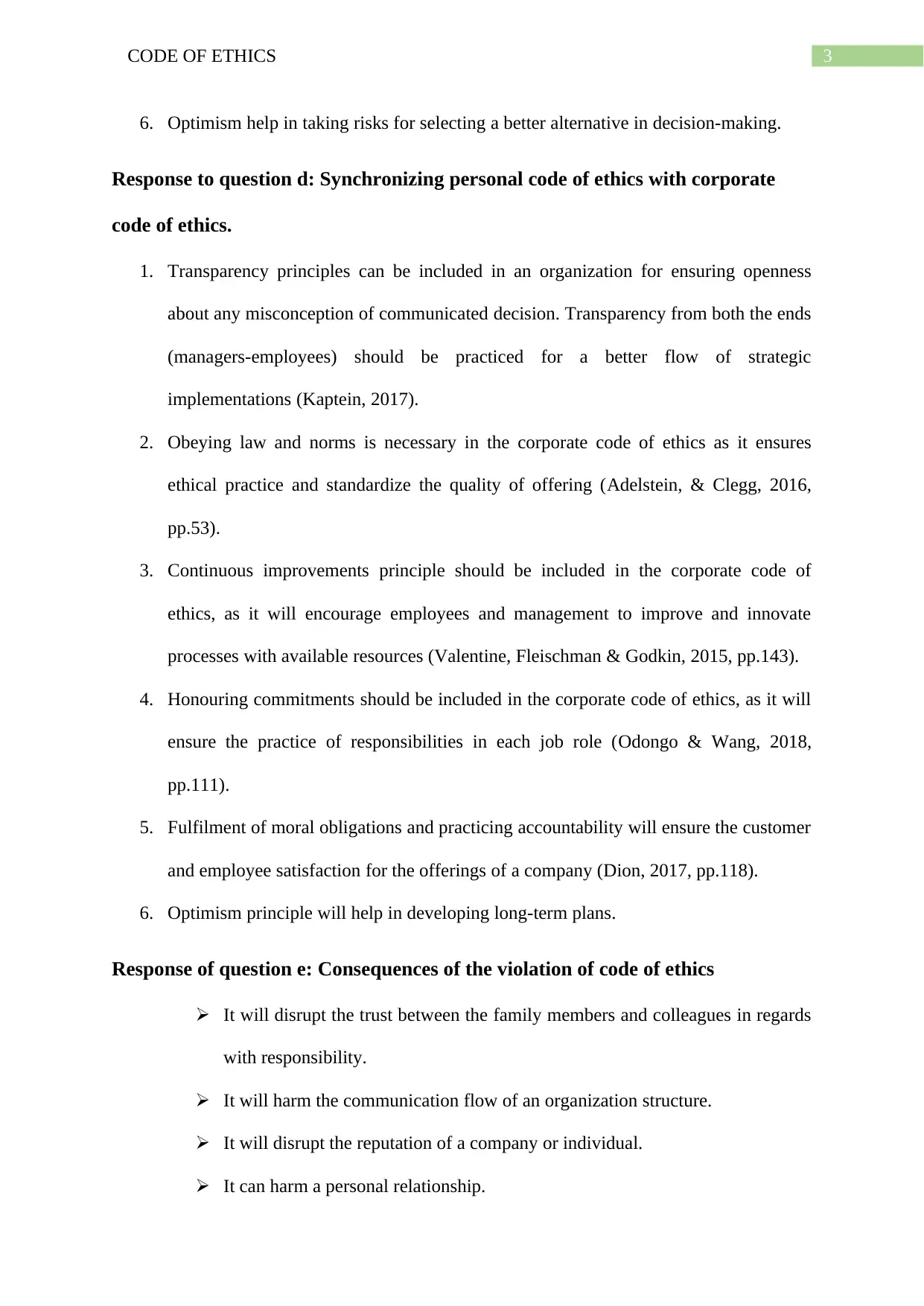
3CODE OF ETHICS
6. Optimism help in taking risks for selecting a better alternative in decision-making.
Response to question d: Synchronizing personal code of ethics with corporate
code of ethics.
1. Transparency principles can be included in an organization for ensuring openness
about any misconception of communicated decision. Transparency from both the ends
(managers-employees) should be practiced for a better flow of strategic
implementations (Kaptein, 2017).
2. Obeying law and norms is necessary in the corporate code of ethics as it ensures
ethical practice and standardize the quality of offering (Adelstein, & Clegg, 2016,
pp.53).
3. Continuous improvements principle should be included in the corporate code of
ethics, as it will encourage employees and management to improve and innovate
processes with available resources (Valentine, Fleischman & Godkin, 2015, pp.143).
4. Honouring commitments should be included in the corporate code of ethics, as it will
ensure the practice of responsibilities in each job role (Odongo & Wang, 2018,
pp.111).
5. Fulfilment of moral obligations and practicing accountability will ensure the customer
and employee satisfaction for the offerings of a company (Dion, 2017, pp.118).
6. Optimism principle will help in developing long-term plans.
Response of question e: Consequences of the violation of code of ethics
It will disrupt the trust between the family members and colleagues in regards
with responsibility.
It will harm the communication flow of an organization structure.
It will disrupt the reputation of a company or individual.
It can harm a personal relationship.
6. Optimism help in taking risks for selecting a better alternative in decision-making.
Response to question d: Synchronizing personal code of ethics with corporate
code of ethics.
1. Transparency principles can be included in an organization for ensuring openness
about any misconception of communicated decision. Transparency from both the ends
(managers-employees) should be practiced for a better flow of strategic
implementations (Kaptein, 2017).
2. Obeying law and norms is necessary in the corporate code of ethics as it ensures
ethical practice and standardize the quality of offering (Adelstein, & Clegg, 2016,
pp.53).
3. Continuous improvements principle should be included in the corporate code of
ethics, as it will encourage employees and management to improve and innovate
processes with available resources (Valentine, Fleischman & Godkin, 2015, pp.143).
4. Honouring commitments should be included in the corporate code of ethics, as it will
ensure the practice of responsibilities in each job role (Odongo & Wang, 2018,
pp.111).
5. Fulfilment of moral obligations and practicing accountability will ensure the customer
and employee satisfaction for the offerings of a company (Dion, 2017, pp.118).
6. Optimism principle will help in developing long-term plans.
Response of question e: Consequences of the violation of code of ethics
It will disrupt the trust between the family members and colleagues in regards
with responsibility.
It will harm the communication flow of an organization structure.
It will disrupt the reputation of a company or individual.
It can harm a personal relationship.
Paraphrase This Document
Need a fresh take? Get an instant paraphrase of this document with our AI Paraphraser
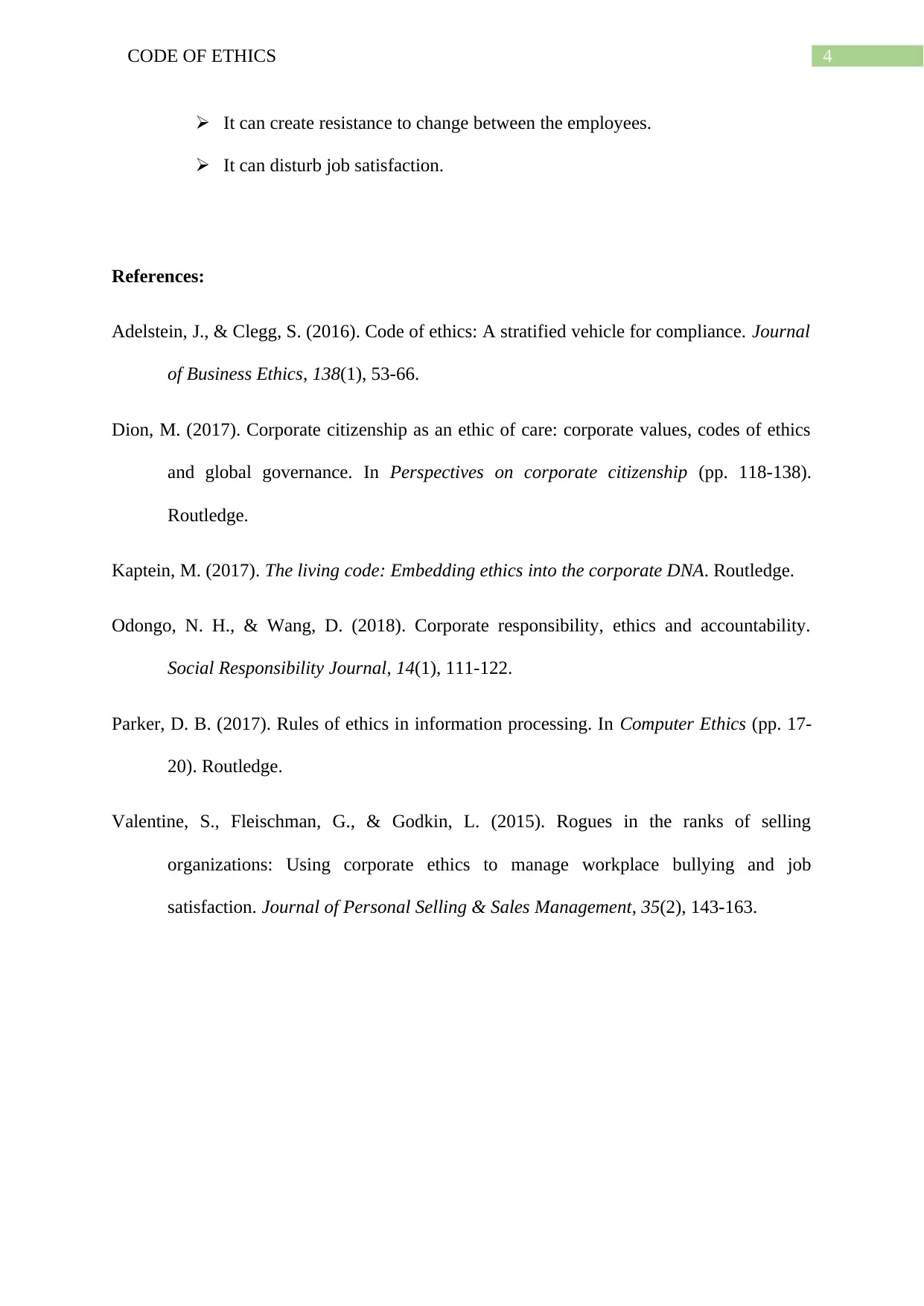
4CODE OF ETHICS
It can create resistance to change between the employees.
It can disturb job satisfaction.
References:
Adelstein, J., & Clegg, S. (2016). Code of ethics: A stratified vehicle for compliance. Journal
of Business Ethics, 138(1), 53-66.
Dion, M. (2017). Corporate citizenship as an ethic of care: corporate values, codes of ethics
and global governance. In Perspectives on corporate citizenship (pp. 118-138).
Routledge.
Kaptein, M. (2017). The living code: Embedding ethics into the corporate DNA. Routledge.
Odongo, N. H., & Wang, D. (2018). Corporate responsibility, ethics and accountability.
Social Responsibility Journal, 14(1), 111-122.
Parker, D. B. (2017). Rules of ethics in information processing. In Computer Ethics (pp. 17-
20). Routledge.
Valentine, S., Fleischman, G., & Godkin, L. (2015). Rogues in the ranks of selling
organizations: Using corporate ethics to manage workplace bullying and job
satisfaction. Journal of Personal Selling & Sales Management, 35(2), 143-163.
It can create resistance to change between the employees.
It can disturb job satisfaction.
References:
Adelstein, J., & Clegg, S. (2016). Code of ethics: A stratified vehicle for compliance. Journal
of Business Ethics, 138(1), 53-66.
Dion, M. (2017). Corporate citizenship as an ethic of care: corporate values, codes of ethics
and global governance. In Perspectives on corporate citizenship (pp. 118-138).
Routledge.
Kaptein, M. (2017). The living code: Embedding ethics into the corporate DNA. Routledge.
Odongo, N. H., & Wang, D. (2018). Corporate responsibility, ethics and accountability.
Social Responsibility Journal, 14(1), 111-122.
Parker, D. B. (2017). Rules of ethics in information processing. In Computer Ethics (pp. 17-
20). Routledge.
Valentine, S., Fleischman, G., & Godkin, L. (2015). Rogues in the ranks of selling
organizations: Using corporate ethics to manage workplace bullying and job
satisfaction. Journal of Personal Selling & Sales Management, 35(2), 143-163.
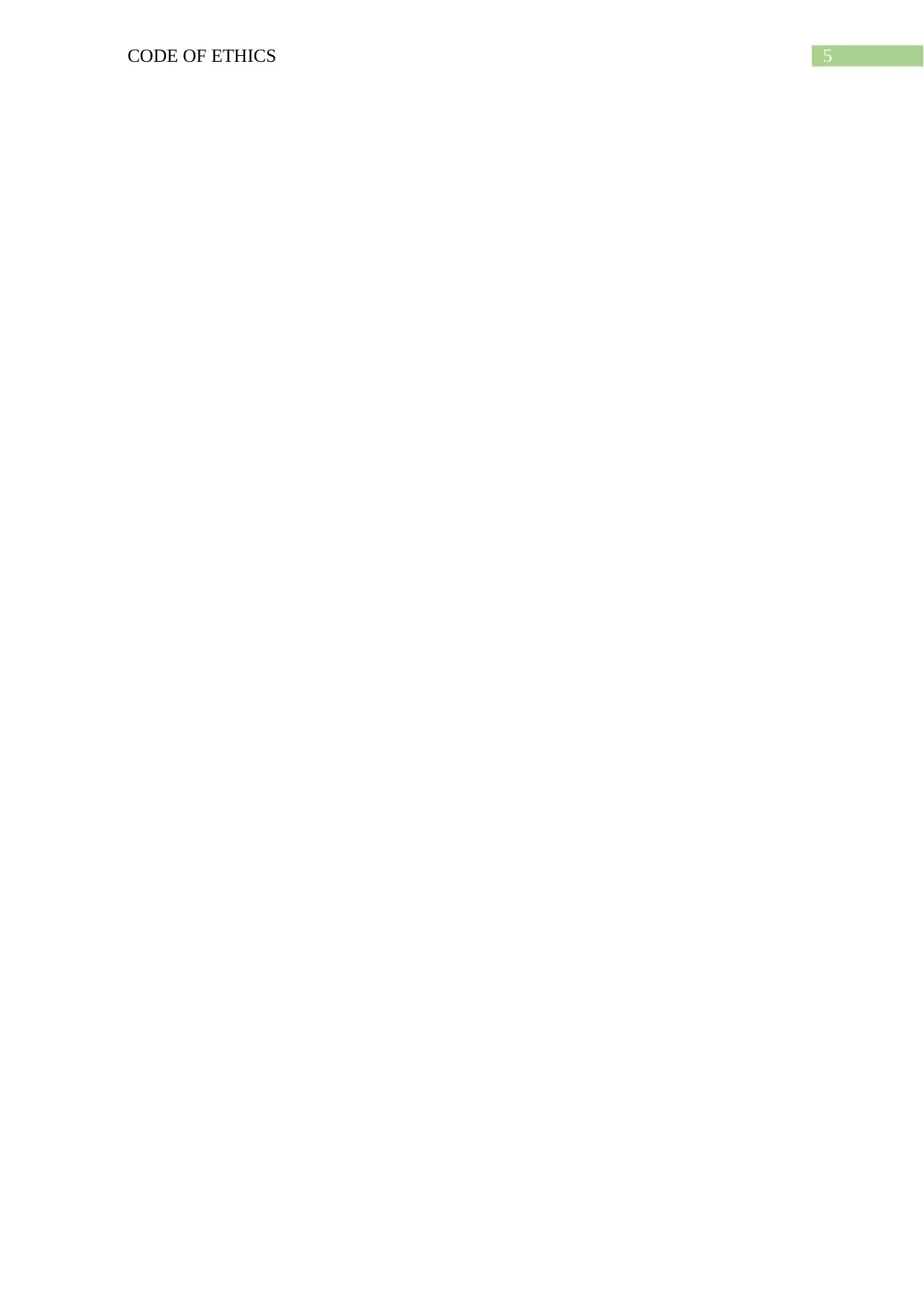
5CODE OF ETHICS
⊘ This is a preview!⊘
Do you want full access?
Subscribe today to unlock all pages.

Trusted by 1+ million students worldwide
1 out of 6
Related Documents
Your All-in-One AI-Powered Toolkit for Academic Success.
+13062052269
info@desklib.com
Available 24*7 on WhatsApp / Email
![[object Object]](/_next/static/media/star-bottom.7253800d.svg)
Unlock your academic potential
Copyright © 2020–2026 A2Z Services. All Rights Reserved. Developed and managed by ZUCOL.





